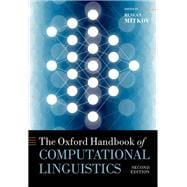
The Oxford Handbook of Computational Linguistics
by Mitkov, RuslanBuy New
Rent Textbook
Rent Digital
Used Textbook
We're Sorry
Sold Out
How Marketplace Works:
- This item is offered by an independent seller and not shipped from our warehouse
- Item details like edition and cover design may differ from our description; see seller's comments before ordering.
- Sellers much confirm and ship within two business days; otherwise, the order will be cancelled and refunded.
- Marketplace purchases cannot be returned to eCampus.com. Contact the seller directly for inquiries; if no response within two days, contact customer service.
- Additional shipping costs apply to Marketplace purchases. Review shipping costs at checkout.
Summary
text-to-speech synthesis, translation technology, opinion mining and sentiment analysis, and the application of Natural Language Processing in educational and biomedical contexts, among many others.
The volume is divided into four parts that examine, respectively: the linguistic fundamentals of computational linguistics; the methods and resources used, such as statistical modelling, machine learning, and corpus annotation; key language processing tasks including text segmentation, anaphora
resolution, and speech recognition; and the major applications of Natural Language Processing, from machine translation to author profiling. The book will be an essential reference for researchers and students in computational linguistics and Natural Language Processing, as well as those working in
related industries.
Author Biography
Ruslan Mitkov, Professor of Computational Linguistics and Language Engineering, University of Wolverhampton
Ruslan Mitkov is Professor of Computational Linguistics and Language Engineering at the University of Wolverhampton, where he is also Director of the Research Institute for Information and Language Processing. He has worked in the fields of Natural Language Processing, computational linguistics,
corpus linguistics, machine translation, translation technology, and related areas since the early 1980s. He is a Fellow of the Alexander von Humboldt Foundation, Germany; Marie Curie Fellow and Distinguished Visiting Professor at the University of Franche-Comté in Besançon, France; and Vice-Chair
of the EC-funded programme 'Future and Emerging Technologies'.
Table of Contents
Preface
List of abbreviations
The contributors
Part I. Linguistic Fundamentals
1. Phonology, Steven Bird and Jeffrey Heinz
2. Morphology, Kemal Oflazer
3. Lexis, Patrick Hanks
4. Syntax, Ronald M. Kaplan
5. Semantics, David Beaver and Joey Frazee
6. Discourse, Massimo Poesio
7. Pragmatics, Christopher Potts
8. Dialogue, Raquel Fernández
Part II. Computational Fundamentals: Methods and Resources
9. Mathematical Foundations, Formal Grammars and Languages, Leonor Becerra-Bonache, Gemma Bel-Enguix, M. Dolores Jiménez-López, and Carlos Martín-Vide
10. Finite-State Technology, Mans Hulden
11. Statistical Methods: Fundamentals, Christer Samuelsson and Sanja Stajner
12. Statistical Models for Natural Language Processing, Kenneth Church
13. Machine Learning, Raymond J. Mooney
14. Word Representation, Omer Levy
15. Deep Learning, Kyunghyun Cho
16. Similarity, Rada Mihalcea and Samer Hassan
17. Evaluation, Rebecca Passonneau and Inderjeet Mani
18. Sublanguages and Controlled Languages, Richard I. Kittredge
19. Lexicography, Patrick Hanks
20. Corpora, Tony McEnery
21. Corpus Annotation, Eduard Hovy
22. Ontologies, Roberto Navigli
Part III. Language Processing Tasks
23. Text Segmentation, Andrei Mikheev
24. Part-of-Speech Tagging, Dan Tufis and Radu Ion
25. Parsing, John Carroll
26. Semantic Role Labelling, Martha Palmer, Sameer Pradhan, and Nianwen Xue
27. Word Sense Disambiguation, Eneko Agirre and Mark Stevenson
28. Computational Treatment of Multiword Expressions, Carlos Ramisch and Aline Villavicencio
29. Textual Entailment, Sebastian Padó and Ido Dagan
30. Anaphora Resolution, Ruslan Mitkov
31. Temporal Processing, Inderjeet Mani
32. Natural Language Generation, Michael Zock and John Bateman
33. Speech Recognition, Lori Lamel and Jean-Luc Gauvain
34. Text-to-Speech Synthesis, Thierry Dutoit and Yannis Stylianou
Part IV. Natural Language Processing Applications
35. Machine Translation, Lucia Specia and Yorick Wilks
36. Translation Technology, Lynne Bowker and Gloria Corpas Pastor
37. Information Retrieval, Qiaozhu Mei and Dragomir Radev
38. Information Extraction, Ralph Grishman
39. Question Answering, John M. Prager
40. Text Summarization, Eduard Hovy
41. Term Extraction, Ioannis Korkontzelos and Sophia Ananiadou
42. Web Text Mining, Ricardo Baeza-Yates, Roi Blanco, and Malú Castellanos
43. Opinion Mining and Sentiment Analysis, Eric Breck and Claire Cardie
44. Spoken Language Dialogue Systems, Robert Dale
45. Multimodal Systems, Elisabeth Andre and Jean-Claude Martin
46. Natural Language Processing for Educational Applications, Jill Burstein, John Sabatini, and Jane Shore
47. Automated Writing Assistance, Robert Dale
48. Text Simplification, Horacio Saggion
49. Natural Language Processing for Biomedical Texts, Kevin B. Cohen
50. Author Profiling and Related Applications, Michael P. Oakes
51. Recent Natural Language Processing Applications, Constantin Orasan and Ruslan Mitkov
An electronic version of this book is available through VitalSource.
This book is viewable on PC, Mac, iPhone, iPad, iPod Touch, and most smartphones.
By purchasing, you will be able to view this book online, as well as download it, for the chosen number of days.
Digital License
You are licensing a digital product for a set duration. Durations are set forth in the product description, with "Lifetime" typically meaning five (5) years of online access and permanent download to a supported device. All licenses are non-transferable.
More details can be found here.
A downloadable version of this book is available through the eCampus Reader or compatible Adobe readers.
Applications are available on iOS, Android, PC, Mac, and Windows Mobile platforms.
Please view the compatibility matrix prior to purchase.
